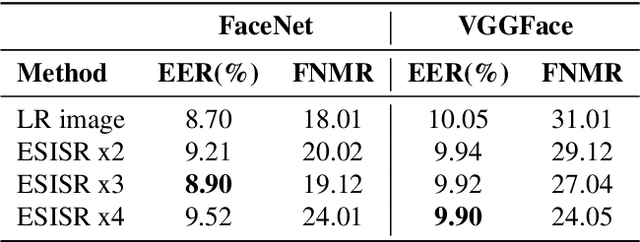Selfie Periocular Verification using an Efficient Super-Resolution Approach
Paper and Code
Feb 16, 2021



Selfie-based biometrics has great potential for a wide range of applications from marketing to higher security environments like online banking. This is now especially relevant since e.g. periocular verification is contactless, and thereby safe to use in pandemics such as COVID-19. However, selfie-based biometrics faces some challenges since there is limited control over the data acquisition conditions. Therefore, super-resolution has to be used to increase the quality of the captured images. Most of the state of the art super-resolution methods use deep networks with large filters, thereby needing to train and store a correspondingly large number of parameters, and making their use difficult for mobile devices commonly used for selfie-based. In order to achieve an efficient super-resolution method, we propose an Efficient Single Image Super-Resolution (ESISR) algorithm, which takes into account a trade-off between the efficiency of the deep neural network and the size of its filters. To that end, the method implements a novel loss function based on the Sharpness metric. This metric turns out to be more suitable for increasing the quality of the eye images. Our method drastically reduces the number of parameters when compared with Deep CNNs with Skip Connection and Network (DCSCN): from 2,170,142 to 28,654 parameters when the image size is increased by a factor of x3. Furthermore, the proposed method keeps the sharp quality of the images, which is highly relevant for biometric recognition purposes. The results on remote verification systems with raw images reached an Equal Error Rate (EER) of 8.7% for FaceNet and 10.05% for VGGFace. Where embedding vectors were used from periocular images the best results reached an EER of 8.9% (x3) for FaceNet and 9.90% (x4) for VGGFace.
 Add to Chrome
Add to Chrome Add to Firefox
Add to Firefox Add to Edge
Add to Edge